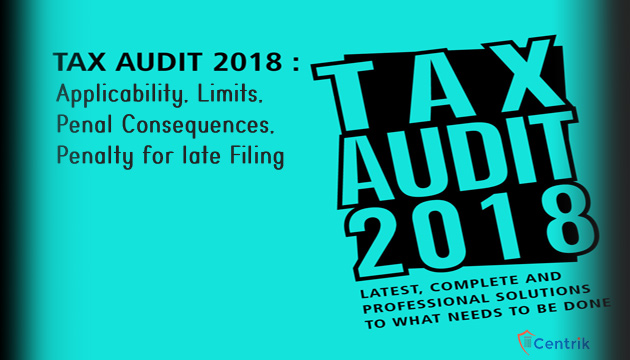
There are various kinds of audit being conducted under different laws such as company audit/statutory audit conducted under company law provisions, cost audit, stock audit etc. Similarly, Income tax law also mandates an audit called ‘Tax Audit’. As the name itself suggests, Tax audit is an examination/review of accounts of the business /profession from Income tax viewpoint such as income, deductions, compliance with income tax law etc.
Section 44AB states that any person carrying out business / Profession is required to get his accounts audited as per provisions of the Income Tax Act, 1961. This is applicable if the taxpayer falls under any of the following category:
Business
In case of a business, tax audit would be required if the total sales turnover or gross receipts in the business exceeds Rs.1 crore in any previous year. Under the Income Tax Act, “Business” simply means any economic activity carried on for earning profits. Section 2(3) has defined the business as “any trade, commerce, manufacturing activity or any adventure or concern in the nature of trade, commerce and manufacture”.
Profession
In case of a profession or professional, tax audit would be required if gross receipts in the profession exceeds Rs.50 lakhs in any of the previous year. A profession or professional could be any of the following as per Rule 6F of the Income Tax Rules, 1962:
- Architect
- Accountant
- Authorized representative
- Engineer
- Film Artist – Actor, Cameraman, Director, Music Director, Editor, etc.
- Interior Decorator
- Legal Professional – Advocate or Lawyer
- Medical Professional – Doctor, Physiotherapist, etc.,
- Technical Consultant
Presumptive Taxation Scheme (Section 44AD read with Section 44AB)
If a person claim that his income from business or profession is lower than the limit prescribed under section 44AD(1) of the Income Tax Act, 1961 i.e.; lower than 8% or 6% as the case may be than the assesse is required to get his accounts audited under section 44AD of the Income Tax Act, 1961.
Due date of furnishing of Tax Audit report
Tax audit report shall be filed on or before the due date of filing the return of income i.e.,30th November of the subsequent year in case taxpayer has entered into an international transaction and 30th September of the subsequent year in case of other taxpayers.
Consequences of non-compliance
Non-Compliance with the provisions of the above act shall attract Penalty under section 271B of the Income Tax Act.
If any taxpayer who is required to get his accounts audited under Income Tax Act, 1961 fails to do so before the due date of furnishing of Tax Audit report, lower of 0.5% of total sales, turnover or gross receipts up to a maximum of Rs 150,000/- may be levied as penalty.
However, the penalty shall be relaxed if there is a reasonable cause for such failure, as per Section 273B. The examples of instances which have been accepted as “Reasonable Cause” are:-
- Resignation of the Tax Auditor and Consequent Delay
- Death or physical inability of the partner in charge of the Accounts
- Labor Problems such as strikes, lock-outs for a long period
- Loss of Accounts because of Fire/Theft etc. beyond the control of the Assesses
- Natural Calamities
Disclaimer – Please note that the above articles is based on the interpretation of related laws and judicial pronouncement which may differ from person to person. The reader are expected to take the expert opinion on the matter.




 join For Updates
join For Updates